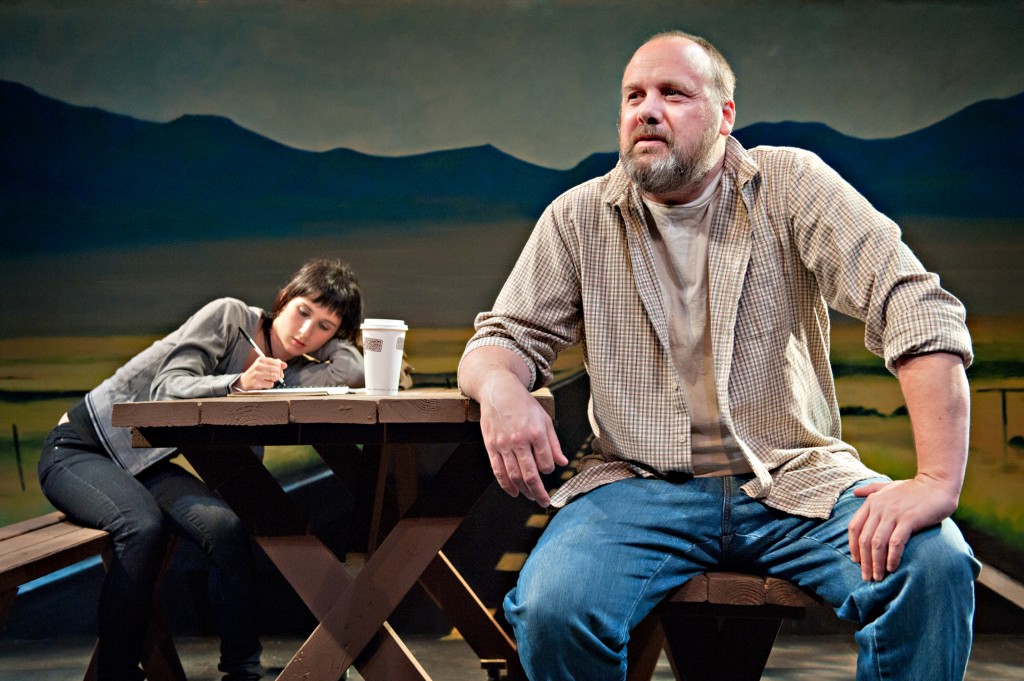
By Bob Hicks
Lee Blessing stopped by his old college stomping grounds Monday night, packing a big dog’s bark and a puppy’s eagerness to please.
Blessing, the author of such frequently produced plays as Independence, A Walk in the Woods, Eleemosynary and Fortinbras, sat alone on Reed College’s Mainstage, a couple of bottled waters propped on a stool next to him, as he read his 1999 one-actor comedy Chesapeake to a crowd of theater regulars, Reedies, and a few old friends.
 Besides being a homecoming of sorts — Blessing is a 1971 grad from Reed, where he directed and was directed by another high-profile theater alum, Eric Overmyer — the reading was one of the opening events of Wordstock, Portland’s annual orgy of bookiness. And it was a highlight of Profile Theatre‘s season-long look at Blessing’s plays, which has just kicked off with the West Coast premiere of Great Falls. All in all it was a convivial, low-key evening, capped by Mead Hunter‘s warm and smart onstage chat with Blessing after the show.
Besides being a homecoming of sorts — Blessing is a 1971 grad from Reed, where he directed and was directed by another high-profile theater alum, Eric Overmyer — the reading was one of the opening events of Wordstock, Portland’s annual orgy of bookiness. And it was a highlight of Profile Theatre‘s season-long look at Blessing’s plays, which has just kicked off with the West Coast premiere of Great Falls. All in all it was a convivial, low-key evening, capped by Mead Hunter‘s warm and smart onstage chat with Blessing after the show.
Chesapeake is the unlikely tale of a New York performance artist named Kerr (he’s best-known for a piece in which he recites The Song of Solomon as members of the audience strip him naked, one piece of clothing at a time) who becomes a pawn in the right-wing war against the National Endowment for the Arts (remember, the year is 1999).
A senatorial candidate from Kerr’s Southern home state with the Strom Thurmond-sounding name of Thurm Pooley and the cynical tactical cleverness of Jesse Helms rides into office by demonizing the “poor-nography” of Kerr’s act, and eventually Kerr decides to strike back: He’ll kidnap Pooley’s boon companion and panting political prop, a Chesapeake Bay Retriever named Lucky, and alienate its affections.
Things, of course, go horribly wrong, and after a fatal tumble over a precipice in the wilds of Virginia, Kerr finds himself trapped in the body of Lucky’s replacement, thinking doggy thoughts and trying to extract his revenge before his Kerr-ness disappears forever and he becomes totally, scent-sniffingly Cur. A play that sometimes seems on the verge of easy left-wing propagandizing instead takes some intriguing twists and turns, both political and personal, and maybe even interspecial: the dog’s in-the-moment point of view has some definite advantages.
Blessing may be best-known for a string of plays that tackle contemporary political and often international problems: Two Rooms, Going to St. Ives, Whores, A Walk in the Woods, even Cobb, his examination of the mean and great in American life through the person of the curdled baseball legend Ty Cobb. But he also happens to be a very funny writer, in a wry and intellectual way, and he seemed in an antic, shaggy-dog storytelling mood Monday night. Blessing has a feeling, maybe even a soft spot, for the absurdities and surprises that fill the spaces between the often violent oppositions of human conduct, and that middle territory is what he likes to twist and pull and nudge into its own interior extremes. Like Shaw and Brecht but without their sense of self-importance, he writes plays that are as much about thinking as feeling, and the way they argue with themselves before generally resolving as neatly as they can has sometimes befuddled New York critics and audiences. Regional audiences seem to better understand and appreciate his plays, which often have a deceptive plainspokenness to go with their soft wit: Blessing spends a lot of effort getting his characters to speak the way people actually talk. The title of his early one-act Nice People Dancing to Good Country Music has always seemed a neat summation of his plays’ appeal, although you also have to read between its lines: good country music can be riddled with uncomfortable assumptions, and even nice people can be desperately unnice. Turn over a rock and who knows what might crawl out? Blessing likes to pick up the rocks and examine the unlikely stuff, and he’s insightful enough to realize that the unlikely and even bizarre can also be pretty ordinary. Chesapeake began, he said, when he wondered what would happen if a man somehow became his worst enemy’s dog. Dogs, remember, are known for their unflinching loyalty to their masters.
Here’s Profile’s season lineup:
- Great Falls, with Tim True and Ana Reiselman, through Oct. 24. It opened Saturday, and Michael McGregor reviewed it here for The Oregonian.
- Chesapeake, Nov. 3-21. Actor Todd Van Voris and director Scott Yarbrough seem like a terrific match for the full production.
- Thief River, Feb. 2-27. Canny vets Tobias Andersen and Shelly Lipkin star for director Pat Patton, whose most recent show is the current revival (through Oct. 10) of Eugene O’Neill’s Ah, Wilderness! at Artists Rep.
- Fortinbras, May 11-June 5. Profile artistic director Jane Unger directs Leif Norby in Blessing’s witty comic take on the aftermath to Hamlet.
In addition, Profile is offering a series of staged readings, including:
- When We Go Upon the Sea, Jan. 12-16
- Independence, March 3-6
- A Walk in the Woods, April 13-24
And this series of “One Night Stands,” single-shot readings of five more plays:
- Patient A, Nov. 15
- Going to St. Ives, Dec. 13
- Flag Day, Jan. 10
- Two Rooms, March 28
- Cobb, May 23
*
PHOTOS, from top:
- Ana Reiselman and Tim True in Lee Blessing’s “Great Falls” at Profile Theatre. Photo: Jamie Bosworth.
- Playwright Lee Blessing.